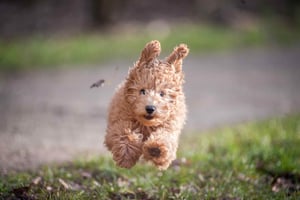Are you wondering how to stop your puppy from biting? Puppy biting is a common problem, but it is...
How to Correct Puppy Biting: A Comprehensive Guide
Puppy biting can be a common problem for new dog owners. Fortunately, there are many methods that can be used to correct puppy biting and help your pup learn better behaviour. This guide will cover the most effective methods for correcting puppy biting and provide you with the necessary tools to help you get started.
Understanding Puppy Biting
Puppy biting is a normal part of puppy development and can be a way for puppies to explore their environment, communicate, and play. Young puppies often bite and chew as they explore the world around them. This behaviour is usually an expression of curiosity and playfulness and is usually not aggressive or malicious.
It is important to understand that puppy biting is a normal behaviour and should not be seen as a sign of aggression or malicious behaviour. If your pup is biting too hard or too frequently, it is important to understand why they are doing it and how to correct the behaviour.
Identifying the Reason for Biting
The first step in correcting puppy biting is to identify the reason for the behaviour. Puppy biting can be caused by a variety of factors, including:
- Boredom
- Teething
- Lack of training
- Lack of exercise
- Fear or anxiety
Once you have identified the reason for the behaviour, you can begin to address the issue. For example, if your pup is biting out of boredom, you can provide them with more mental stimulation and exercise to help keep them occupied. If they are teething, you can provide them with appropriate chew toys to help them through the teething process.
Redirecting the Behaviour
Once the reason for the biting has been identified, the next step is to redirect the behaviour. This can be done by providing your pup with an appropriate object to chew on, such as a chew toy or a stuffed animal. Whenever your pup begins to bite, you can redirect them to the appropriate object by saying a firm “No” and then offering them the object.
It is important to be consistent with this method, as it will help your pup learn that biting is not acceptable behaviour. This method should be used in combination with other methods, such as positive reinforcement and training, to help your pup learn the desired behaviour.
Positive Reinforcement
Positive reinforcement is a powerful tool for teaching your pup the desired behaviour. Whenever your pup exhibits the desired behaviour, such as not biting, you should reward them with praise, treats, or playtime. This will help your pup learn that the desired behaviour is rewarded and will help them to learn the desired behaviour more quickly.
It is important to remember that positive reinforcement should be used in combination with other methods, such as redirecting the behaviour and providing appropriate chew toys. This will help your pup learn the desired behaviour more quickly and effectively.
Providing Appropriate Chew Toys
Providing your pup with appropriate chew toys is an important part of correcting puppy biting. Chew toys provide your pup with an appropriate outlet for their chewing and biting behaviour and can help reduce the amount of biting and chewing they do.
It is important to provide your pup with chew toys that are appropriate for their size and age. For example, puppies should not be given hard chew toys, as these can be a choking hazard. It is also important to ensure that the toys are made of non-toxic materials, as some toys can be harmful if ingested.
Training and Socialisation
Training and socialisation are important for helping your pup learn the desired behaviour. Training provides your pup with the tools they need to learn the desired behaviour, such as basic obedience commands. Socialisation is important for helping your pup learn how to interact with other dogs and people in a positive way.
It is important to remember that training and socialisation should be done in a positive and reward-based way. This will help your pup learn the desired behaviour more quickly and effectively.
Conclusion
Puppy biting can be a common problem for new dog owners, but it can be corrected with the right methods. Understanding why your pup is biting, redirecting the behaviour, providing appropriate chew toys, and training and socialisation are all effective methods for correcting puppy biting. With the right tools and techniques, you can help your pup learn the desired behaviour and create a positive and enjoyable relationship with your pup.



